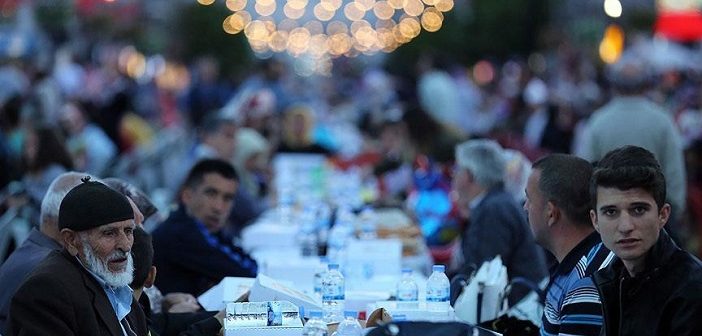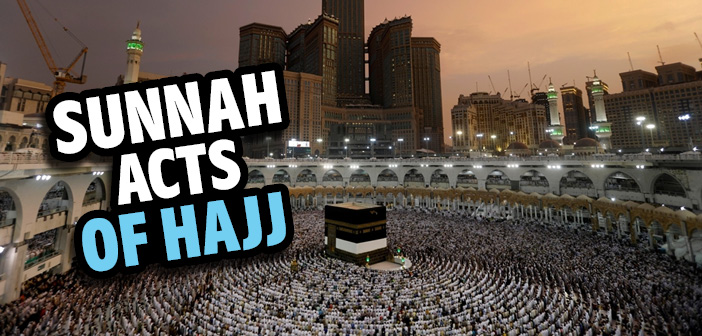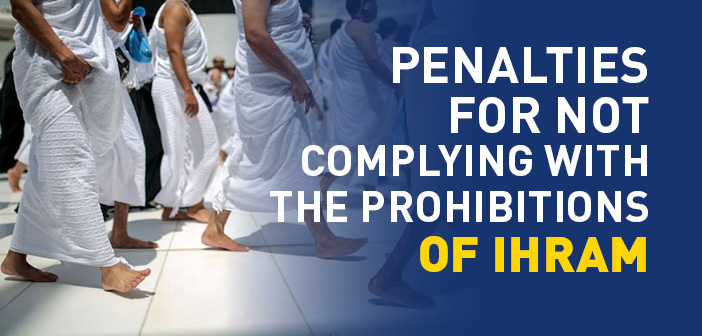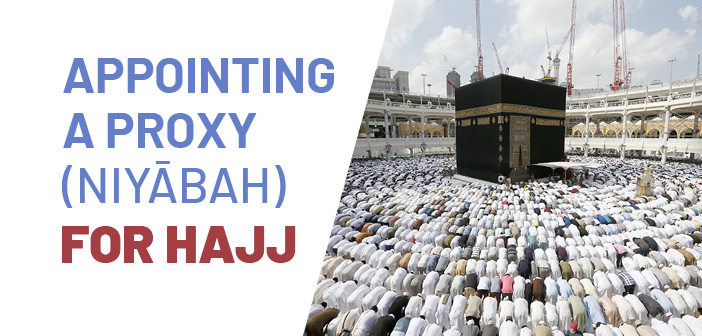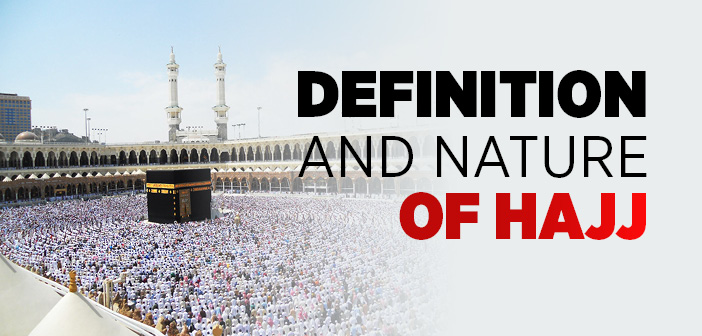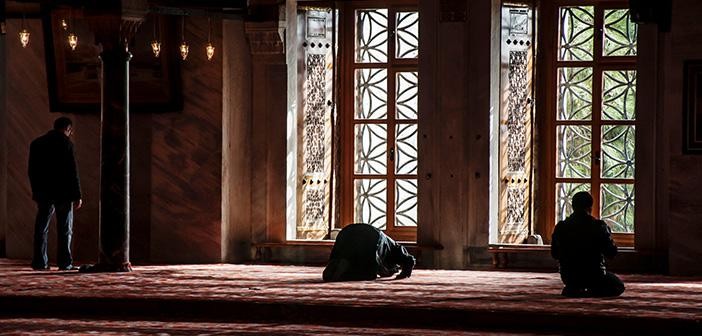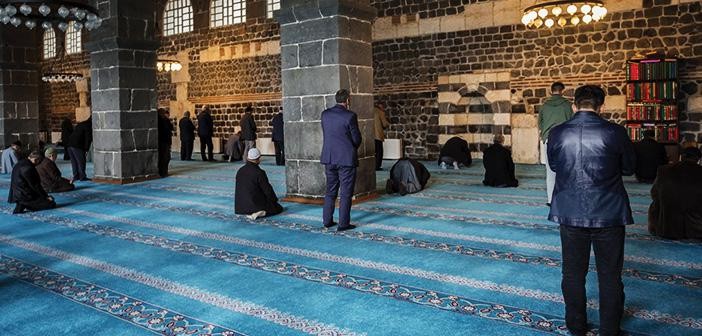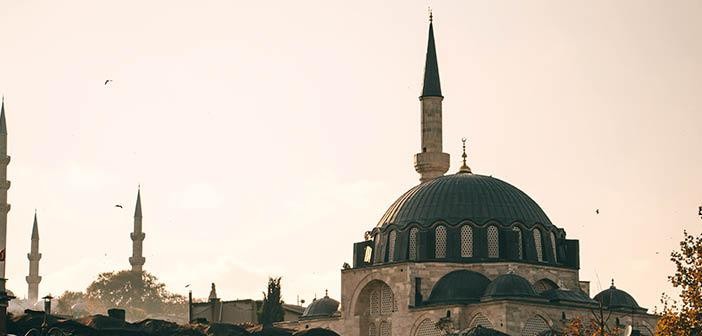
What is The Ghusl?
What is the ghusl in islam? What is the major ablution? How do you perform major ablution?
1) Basic information and textual proofs
In the dictionary, the word ghasl means to wash with water, and ghusl and ightisāl means to be washed with water. In Islamic legal terminology, it refers to the ritual cleaning done by washing the whole body with clean water. Another word for ghusl is major ablution. While wuḍū performed as a preparation for the ritual prayer is called “minor ablution”, ghusl is called major ablution or “great cleanliness”. The condition that requires the performance of the former one is called “minor ritual impurity (ḥadath al-aṣgar)”, and the latter is called “major ritual impurity (ḥadath al-akbar)”.
In the Qur’an, three verses describe the major ablution. In the first one of these verses, the necessity of major ablution due to the state of janabah is stated as follows: “…If you are in a state of ceremonial impurity, bathe your whole body...”[1] and the second Qur’anic verse is concerning the prohibition of sexual intercourse with women who are in menstrual period, “And they will ask you about [woman’s] monthly courses. Say: “It is a vulnerable condition. Keep, therefore, aloof from women during their monthly courses, and do not draw near unto them until they are cleansed; and when they are cleansed, go in unto them as Allah has bidden you to do.” Verily, Allah loves those who turn unto Him in repentance and He loves those who keep themselves pure.”[2] In the third Qur’anic verse, the believer is commanded not to perform the ritual prayer unless one is bathed from the state of janabah as follows: “O you who believe! Do not approach the prayer until you know what you are saying while intoxicated, and until you perform ghusl when you are junub, except for those who are traveling.”[3]
There are various hadiths about the necessity of ghusl, and how to perform it in case of janabah, and in case of cessation of menstruation and puerperal bleeding. For example, in two of such hadiths, the Messenger of Allah (saw) said, “There is ghusl for semen and wuḍū for madhi.”[4], and “When the circumcised meets the circumcised, then indeed ghusl is required even if there is no ejaculation.” [5]
Wisdom and benefits of ghusl: Many eastern and western scientists have expressed the importance and benefit of ghusl in terms of human health and cleanliness. In general, it has become a prominent feature of Muslim nations, and the symbol of the importance given to health and the human body by the Islamic civilization. By means of ghusl, the material residues and impurities that are left in the human body by the state of janabah, menstruation, and postpartum bleeding are cleansed. In addition, such cleaning contains many benefits such as eliminating the tiredness and slackness that can be caused by the state of janabah, establishing a new balance in the body, regulating the blood circulation, and putting the person into the ambiance of worship by getting rid of ritual impurity. As with every command of Allah, there is much wisdom and benefits in ghusl, some of which we know and others that we do not know.
Three main reasons make the act of ghusl necessary. The state of janabah, menstruation and puerperium. However, these three qualities do not make a person impure. For the Prophet (saw) said, “A believer cannot be impure”. Abu Huraira (ra) narrates: “I met the Prophet when I was in the state of janabah. Although he extended his hand to me to shake my hands, I did not give my hand saying, “I am junub”. Subḥānallah! He said that a believer could never be impure.” A similar encounter took place with Hudhayfa (ra) and the Prophet (saw) said similar words to him.[6]
Accordingly, being in a state of major ritual impurity means that a person in the state of janabah, in menstruation or postnatal bleeding period does not have the necessary spiritual prerequisite to perform certain acts of worship or perform acts closely related to worship. Alternatively, especially in the case of exempting women from certain acts of worship in their distinct situation or delaying the time of such acts of worship, the “principle of facility” is applied. The possibility for delaying the major ablution until the first prayer time, the exemption of women from ritual prayers during menstruation and postpartum bleeding, and the right to delay obligatory fasting until after Ramadan are all pieces of evidence demonstrating this fact.
2) Situations That Require Ghusl
a) The state of janabah: In Islamic legal terminology, janabah refers to the state of major ritual impurity, which takes place by the discharge of semen from the body through sexual intercourse, wet dream, or similar ways, and which prevents the person from certain acts of worship.
The ejaculation of the semen from the genitals of a man or woman with the usual sexual arousal and pressure, by looking or thinking while being asleep or awake, or having sexual intercourse causes the state of janabah. Semen is a dense liquid that comes out with pressure at a time of increased sexual arousal. The semen of the woman is a thin liquid and yellow in color.
Ghusl is not required due to madhi and wadi. Madhi is a thin liquid close to being white in color, and it comes out of the genitals when the spouses feel sexually close to each other. Wadi, on the other hand, is a thick liquid that comes from the genitals after urinating. Both these fluids spontaneously come out without lust.
If an unconscious or drunk person later finds wetness in his underwear that he thinks is semen, as a precaution he should perform ghusl.
If semen comes out of a person after performing ghusl it is necessary to perform ghusl again.
On the other hand, if semen comes out on its own, such as due to lifting something heavy or jumping from a high place, without lust or pressure, there is no need for ghusl. This is because, the ceremonial impurity (janabah) mentioned in the Qur’anic verse “…If you are in a state of ceremonial impurity, bathe your whole body...”[7] expresses the ejaculation of the semen by lust.
According to Abu Ḥanīfa and Imam Muhammad, ghusl is required because of the semen that leaves the body with lust and comes out after the lust has ceased. According to Abu Yusuf, it is not necessary. Again, if a person performs the major ablution after sexual intercourse prior to going to sleep, but without urinating or walking for a while, and then if semen comes out of him without the feeling of lust, he must perform the major ablution again according to Abu Ḥanīfa and Imam Muhammad, but he does not need to do so according to Abu Yusuf. According to the Shafiʿis and the Malikis, it does not matter in the afore-mentioned situations whether the semen is discharged with lust or not, the ghusl is a requisite either way.
The following hadiths indicate that ghusl is necessary when the semen is discharged, Ali (ra) said, “I was a person who had too much madhi. I asked the Prophet (saw) about it, and he said, “There is ghusl for semen and wuḍū for madhi.”[8] It is reported from Umm Salama (r. anha) that she said: “The mother of Anas, Umm Sulaym, said: ‘O Messenger of Allah! Allah does not shy away from being told the truth. Is it necessary for a woman to perform ghusl when she sees a wet dream?’” The Prophet (saw) said: “Yes if she feels wetness, she must.” Thereupon, Umm Salama, who was present there, asked, “Can a woman have a wet dream?” The Prophet (saw) said: “May Allah reward you! Well, how does her child look like her?”[9]
In madhi and wadi, only the genitals are washed and the minor ablution is performed. This is because the Messenger of Allah said, “Every man discharges madhi and therefore (when it happens) it is necessary to perform wuḍū for it.”[10]
Whereas the ghusl is required in the case of sexual intercourse, if both parties are over the age of puberty, and if the place of circumcision or a similar part penetrates the woman. Whether the semen comes out or not does not change the consequence. If only one party is at the age of puberty, a ghusl is required for that party. According to the Shafiʿis, puberty is not important and the ghusl is required for both parties.
The Prophet said: “Ghusl is required when the two circumcised places meet even if there is no ejaculation.”[11]
If a person who wakes up remembers that he had a wet dream and feels wetness on his genitals, he must perform the ghusl. As for ejaculating while urinating, if the sexual organ is in an erect position the ghusl is required, otherwise, it is not. This is because the presence of erection here is considered evidence of the existence of lust.
b) When menstruation and puerperium ends: The woman whose menstruation and puerperium (postpartum bleeding) state has come to an end must perform the major ablution. In a Qur’anic verse, it is stated, “…Keep, therefore, aloof from women during their monthly courses, and do not draw near unto them until they are cleansed; and when they are cleansed, go in unto them as Allah has bidden you to do…”[12] The Prophet (saw) said to Fatima Binti Abi Hubaysh, “…when your real menses begins, give up your prayers, and when it has finished wash off the blood (take a bath) and offer your prayers.”[13]
The following words of the verse indicate the necessity of ghusl after menstruation or puerperium: “…and when they are cleansed, go in unto them as Allah has bidden you to do…”[14] The purpose of their “cleansing” in this verse is their implementation of ghusl.
In the event of a woman giving birth or miscarriage, ghusl is still necessary even if there is no postpartum blood according to all schools, except for the Ḥanbalis.
c) Carrying out ghusl of the corpse: It is a communal obligation (farḍ kifaī) imposed on the Muslim community to have a deceased Muslim, who is not a martyr or not in the state of janabah, washed in the way of ablution. This is an indication of love, respect, and esteem shown to Muslims who have passed on. The Messenger of Allah (saw) said about a man who fell from his mount and died, “Wash him with water and leaves of the cedar tree and shroud him with two pieces of cloth.”[15]
d) Situations in which it is considered sunnah or mustaḥab to perform ghusl: According to the Maliki and the Ḥanbali jurists, it is wājib to perform ghusl for a person who has just converted to Islam, but mandūb according to the Ḥanafis and the Shafiʿis. On the other hand, there is consensus for a new convert to perform ghusl if he/she is in a state of ceremonial impurity. In the story of Umar’s conversion to Islam, Umar’s sister’s reluctance to give him the pages of the Qur’an that she was reading proves the existence of such an understanding at the beginning of Islam.[16] The meaning of this practice is to be cleansed from all material and spiritual impurities of the past and make a clean start on a new life.
It is a sunnah to perform ghusl before Friday and Eid prayers when entering the state of ihram with the intention of doing minor or major pilgrimage and for the ritual of standing in the plain of Arafat. The following is stated in a hadith, “The person who performed wuḍū on Friday has done a good deed. If he performs ghusl, that is even more virtuous.”[17] It is also reported that the Prophet (saw) performed ghusl for the Eid prayers,[18] and the Eid prayers were compared to the Friday prayer.
In addition to the ones listed above, it is also recommended to perform ghusl in various situations, such as when entering Mecca and Medina, staying overnight in Muzdalifah, performing the visiting and farewell circumambulation, washing the deceased, having blood drawn, wishing to revive the sacred nights such as the night of Barat and Qadr, attending a meeting, returning from a journey, wearing new clothes, during solar and lunar eclipses, before the rain prayer, in case of janabah, carrying out the ghusl before the obligatory prayer time, and repenting for a sin.[19]
3) Fard Acts of Ghusl
The proof showing the obligation of ghusl is the Qur’anic verse, “…If you are in a state of ceremonial impurity, bathe your whole body...”[20], the Qur’anic verse that states the prohibition of sexual intercourse with women during their menstrual cycles until they are cleansed[21] and the Qur’anic verse that commands those who are in ceremonial impurity not to approach the prayer until they have taken a bath.[22] Aisha (r. anha) described how the Messenger of Allah (saw) performed ghusl as follows: “When Allah’s Messenger (saw) bathed because of sexual intercourse, he first washed his hands: he then poured water with his right hand on his left hand and washed his private parts. He then performed ablution as is done for prayer. He then took some water and put his fingers and moved them through the roots of his hair. And when he found that these had been properly moistened, then poured three handfuls on his head and then poured water over his body and subsequently washed his feet.”[23]
According to the Ḥanafis, there are three farḍ acts of ghusl: washing the mouth, the nose, and the whole body once.
a) Washing the mouth and the nose (maḍmaḍa and istinshāq): According to the Ḥanafis and the Ḥanbalis, the mouth and the nose are the outer part of the body during ghusl, so they must be washed. This is done by drawing enough water into the mouth and the nose and cleaning them more carefully than it is done during the wuḍū. The basis of this is the Qur’anic verse, “…If you are in a state of ceremonial impurity, bathe your whole body...” There are also several hadiths in this regard such as “Then pour plenty of water on you”[24], and “It is obligatory for the person in the state of janabah to draw water into his mouth and nose.”[25] Therefore, according to the Ḥanafis and the Ḥanbalis washing the inside of the mouth and nose falls within the scope of “washing every possible part of the body”. According to the Shafiʿis and Malikis, it is sunnah to wash the mouth and nose during ghusl for they do not consider them as part of the outer side of the body.
Tooth filling and capping made for the purpose of treatment are like paint and paste that remains on the skin and prevents water from reaching the skin after thoroughly being cleaned using soap, and they do not hinder the validity of the ghusl.
b) Washing the whole body: Water must reach all of the skin and hair at least once. It has been stated in a hadith; “Under each strand of hair is major impurity. Therefore, let the wetness reach to the roots of the hair and clean the skin thoroughly.”[26]
While performing the ghusl, it is necessary to immerse in the water thoroughly so that no part of the body remains dry.
Most jurists, except the Ḥanafis, added “intention” to the farḍ acts of ghusl, and the Malikis also added, “rubbing the body” and “washing the limbs sequentially (muwalāt)” to its farḍ acts.[27]
In addition to these, according to the Ḥanbalis saying basmala is one of the farḍ acts of ghusl for those who remember it. Whereas for those who forget to say basmala at the beginning, they are forgiven.[28]
Women’s braided hair does not have to be undone, it is sufficient for water to reach the bottom of it.[29] This is because the Messenger of Allah (saw) gave permission to Umm Salama (r. anha) to perform ghusl without undoing her braids.[30] This is a convenience shown to Muslim women with long hair. The Ḥanbalis consider it necessary to untie the braid and wash the hair in a ghusl performed due to the end of the menstruation and postnatal bleeding.
Since the medical procedure done through tissue transplantation called “hair transplant” today, gives vitality to the hair, the transplanted hair should be accepted like one’s own hair. Such hair does not prevent the validity of the ghusl. However, planting the hair on a thin plastic layer and attaching it to the bald head will prevent the water to reach the skin of the head, so it is similar to a wig and is deemed an obstacle to the validity of ghusl.
While performing the ghusl if there is a bandage wrapped over a wound on the body, and if washing it will not be harmful to the wound, the bandage should be untied and the wound should be washed, otherwise wiping over the bandage would replace the washing part. In skin diseases such as burns, where the skin should not be wetted with water, other parts of the body are washed or wiped with a wet cloth to complete the ablution. If wiping will also cause harm, tayammum can be performed. Tayammum is sufficient for both in place of wuḍū and cleansing from the state of janabah, menstruation, and postpartum bleeding. However, as soon as the person regains the ability to use water, tayammum will be invalidated and it becomes necessary to get cleansed with water.
According to the Ḥanafis, if a person who is in a state of major impurity dives into a sea, lake, river, or pool by taking water in his mouth and nose, or if his whole body gets wet by standing in the rain, he is considered to have performed the ghusl.
4) Sunnah Acts of Ghusl
a) To begin the ghusl with basmala and intention. According to the three madhhabs, except for the Ḥanafis, this intention is obligatory. Knowing that one is washing his/her body in order to be purified from major impurity is considered intention and becomes the reason to gain the reward of worship.
b) Washing the hands and private parts of the body first, and removing the material impurities, if any, from the body.
c) Afterwards to perform wuḍū just like it is done for the ritual prayer. If a puddle is formed in the place where the person takes the bath, washing the feet can be left to the end of the ghusl. Drawing water to the mouth and nose while performing the wuḍū can replace drawing water to the mouth and nose in the ghusl, which is obligatory according to the Ḥanafis and the Ḥanbalis.
d) After the wuḍū, pouring water on the head, then over the right and then over the left shoulder three times, and rubbing the body thoroughly each time. As mentioned before according to the Malikis, rubbing the body while washing is one of the obligatory acts of ghusl. If the feet have not been washed before, wash the right and then the left foot before leaving the bath.
e) Avoiding using too much or too little water while performing the ghusl.
f) To bathe in a place where others cannot observe. However, while bathing in public places such as hot springs, swimming pools, or Turkish baths, a Muslim should cover his private parts with a loincloth or a garment that covers the area between the knees and the navel, and avoid looking at the private parts of others. The Prophet (saw) ordered Muslims to enter the bath with a cloth, and it was stated that angels would curse those who wash their private parts or bathe naked.[31] The fact that going to public baths is considered disliked in some hadiths and fiqh books is based on the concerns that immorality seen in neighboring countries and towns may spread among Muslims, and this was an effort to take precautions against it. Historical spas and baths have been an integral part of Islamic civilization and architecture in the periods when these dangers and drawbacks were not present.
g) Not to expose one’s private parts during ghusl even when it is performed out of sight. If the private part is exposed, not to turn in the direction of the qibla.
h) Not to talk while performing the ghusl.
i) To dry the body with a towel after the ghusl is over.
j) To dress quickly after the ghusl.
k) If a person who is in a state of major impurity dives into water such as a pool, river, lake, or sea, moves his limbs, or stays in the water for a suitable period of time enough to perform wuḍū and ghusl, he is also in compliance with the sunnah.[32]
Unlike the wudu, it is makrūḥ to recite supplications while performing the ghusl since it is presumed that the person who performs ghusl is generally not in a clean place.
5) Things that are not permissible for the person who is in the state of Janabah, menstrual or postpartum bleeding.
a) To perform prayer and to fast. It is not permissible for a person in the state of janabah, in menstruation or postpartum bleeding period to perform any obligatory or supererogatory prayer, prostration of recitation, or to take part in obligatory or supererogatory fasting. The evidence for this is the verses we have mentioned earlier, “…If you are in a state of ceremonial impurity, bathe your whole body...”, and “O you who believe! Approach not prayers … in a state of ceremonial impurity (Except when traveling on the road), until after washing your whole body...” In addition, upon the query of Fatima bint Abi Hubaysh, the Prophet’s (saw) said to her, “…when your real menses begins, give up your prayers.”[33] On the other hand, women do not make up the prayers that they cannot perform during their menstrual courses, while they do make up the obligatory fasts that they could not perform during those specific days. Upon an inquiry by Muādha ( anhâ), Aisha (r. anhâ) said that this had been the practice of the Prophet (saw).[34]
However, the situation of not being able to find the time and opportunity to perform ghusl due to the state of janabah before the time of imsāk or having a wet dream during a daytime sleep does not affect the fasting of that day. (See the chapter on fasting.)
b) To circumambulate the Ka’ba even if it is supererogatory since it is stated in the hadith that circumambulation is a type of prayer.[35]
c) Touching the Qur’an. It has been commanded in a verse, “Only those who have been thoroughly cleansed can touch it.”[36] However, in the hadiths that interpret the verse, the phrase “ṭāhir (the clean ones)” is used instead of the phrase “taṭahhur (to be thoroughly cleansed)”.[37] Accordingly, only those who have been purified of the state of janabah can touch the Qur’an. However, it is permissible to keep the Holy Qur’an in a non-attached sheath, bag, sack, or box.
According to a view of Abu Ḥanīfa, the Qur’an can be touched without being in the state of wuḍū. According to another view reported by him, only the outer shell can be touched without being in the state of wuḍū. According to the Shafiʿis and the Malikis, touching the Holy Qur’an without being in the state of wuḍū is not permissible.[38]
d) Reading the Qur’an (without touching it). In a hadith narrated by Ibn Umar (ra), it is stated: “Neither a menstruating woman nor a junub person can recite anything from the Qur’an.”[39] It is narrated that Ali (ra) said: “After going to the restroom, the Messenger of Allah (saw) would go out, eat bread and meat with us, recite the Qur’an. Nothing would separate him from the Qur’an, except for the state of major impurity.”[40] Another narration on the subject is as follows: “He used to teach us the Qur’an in any case as long as he was not in the state of major impurity.”[41]
However, it is possible and permissible before performing ghusl to recite certain chapters and verses of the Qur’an such as Fatiḥa, Ikhlas, the Verse of Throne, Rabbanā atinā with the intention of invocation and dhikr in the state of major impurity. Even though ghusl is required, the words of dhikr, tasbiḥ, ṣalāt al-salām, and kalima al-shahadah can be recited. Moreover, in case of menstruation or postpartum bleeding, the Qur’an can be recited by repeating its words for educational purposes.
It is makrūḥ for a person who is in a state of ceremonial impurity to touch and read religious books without performing the ghusl, to eat and drink without washing her or his hands, and to write the verses of the Qur’an on a piece of paper that he or she does not hold in his or her hands.
According to Imam Malik, although a woman who is in the state of janabah cannot read the Qur’an, a woman in menstruation or puerperium can read it. This is based upon the reason that while the state of janabah can be cleansed immediately, the cleansing from menstruation or postpartum period cannot be done for an extended time. The evidence that is relied on in this case is juristic preference (istiḥsān).[42]
According to Imam Shafiʿi, Imam Ahmad Ibn Ḥanbal, Sufyan al-Thawri, and Ishaq, a person can recite the Qur’an from memory without being in the state of wuḍū, but he or she cannot read directly from the book of the Qur’an without ablution.
e) Entering or passing through a mosque unless it is necessary. Ibn Abbas (ra) interpreted the verse, “…O you who believe! Approach not prayers … in a state of ceremonial impurity (Except when traveling on the road), until after washing your whole body...”[43] as “Do not enter the mosque while you are in the state of janabah except crossing through it”. According to this interpretation, one can pass through the mosque when a person is in the state of janabah, but it is not allowed to sit there.[44] As a matter of fact, the doors of some of the Ansar’s houses were opening towards the mosque, and sometimes they were in the state of junub and could not find water, so they had to pass through the mosque. The Prophet’s (saw) saying, “Close every door that opens towards the mosque, except the door of Abu Bakr”[45] is a proof in this matter. According to a narration from Aisha (anha), the Prophet (saw) asked the Companions to turn the doors of their houses, which opened towards the Masjid an-Nabawi, to another direction, and when he (saw) saw that the house owners were slow to do this task, he further said, “I do not make the mosque lawful for a menstruating woman and for a person who is sexually defiled.”[46] The narration of Umm Salama (r. anha) is as follows: “The Prophet (saw) called out with his loudest voice: ‘Indeed, the mosque is not permissible for the people in the state of ceremonial impurity.’”[47] On the other hand, when Aisha (r. anha) had a menstrual period during the Farewell Pilgrimage, the Messenger of Allah said to her, “O Aisha! Except for circumambulating the Ka’ba, you will perform all the rituals of pilgrimage with us.”[48]
However, it is possible and permissible for a junub or menopausal person to enter the mosque due to a need, not for the purpose of worship. According to the narration from Aisha (r. anha), she said: “One day the Messenger of Allah told me, “Get me the mat from the mosque.” When I said I am menstruating, he said to me, “Your menstruation is not something in your control.”[49]
On the other hand, the fast of a person who reaches the morning in the state of ceremonial impurity in Ramadan or who sleeps during the day is not nullified.
[1] Al-Mā’ida, 5: 6.[2] Al-Baqara, 2: 222.[3] Al-Nisā, 4: 43. If water is not found or cannot be used during a journey, “tayammum (sand ablution)” replaces the ghusl in order to get cleansed from the state of janābah.[4] Al-Shawkanī, Nayl al-Awṭār, I, 218.[5] Al-Bukhari, Ghusl, 28; al-Tirmidhī, Ṭaḥāra, 80; Ibn Maja, Ṭaḥāra, 111.[6] Al-Bukhari, Ghusl, 23, 24, Janā’iz, 8; Muslim, Ḥayḍ, 115, 116; Abū Dawūd, Ṭaḥāra, 91; al-Tirmidhī, Ṭaḥāra, 89; al-Nasā’ī, Ṭaḥāra, 171; Ibn Maja, Ṭaḥāra, 80.[7] Al-Mā’ida, 5: 6.[8] Al-Shawkanī, Nayl al-Awṭār, I, 218.[9] Al-Shawkanī, ibid, I, 219.[10] Al-Zaylaī, ibid, I, 93.[11] Al-Bukhari, Ghusl, 28; al-Tirmidhī, Ṭaḥāra, 80; Ibn Maja, Ṭaḥāra, 111.[12] Al-Baqara, 2: 222.[13] Al-Bukhari, Wuḍū, 63, Ḥayḍ, 24; Muslim, Ḥayḍ, 62,63; Abū Dawūd, Ṭaḥāra, 107; al-Tirmidhī, Ṭaḥāra, 93, 95, 96.[14] Al-Baqara, 2: 222.[15] Al-Bukhari, Janāiz, 19, 20, 21, Sayd, 20, 21; Muslim, Ḥajj, 93, 94, 96, 98, 99; Abū Dawūd.[16] Al-Qurṭubī, Jāmīʿ, XVII, 146.[17] Al-Bukhari Wuḍū, 46; Muslim, Ṭaḥāra, 8, 12; al-Nasā’ī, Jumʿa, 9.[18] Al-Shawkanī, ibid, I, 236.[19] See Ibn al-Humām, ibid, I, 443 ff.; al-Maydanī, ibid, I, 23; Ibn Abidīn, ibid, I, 156-158; al-Shurunbulālī, ibid, p. 18; al-Zuhaylī, ibid, I, 386 ff.; Bilmen, İslam İlmihali, Istanbul 1959, p. 126-127; Komisyon, İlmihal, I, 206.[20] Al-Mā’ida, 5: 6.[21] Al-Baqara, 2: 222.[22] Al-Nisā, 4: 43.[23] Muslim, Ḥayḍ, 35; al-Nasā’ī, Ghusl, 15; Darimi, Wuḍū, 40; Ahmad ibn Ḥanbal, VI, 140, 173, 330, 336.[24] Muslim, Ḥayḍ, 58; Abū Dawūd, Ṭaḥāra, 120; al-Tirmidhī, Ṭaḥāra, 77; al-Nasā’ī, Ṭaḥāra, 149; Ibn Maja, Ṭaḥāra, 108.[25] Al-Mawṣilī, Ikhtiyār, I, the chapter about ghusl.[26] Al-Tirmidhī, Ṭaḥāra, 77, al-Nasā’ī, Ṭaḥāra, 149; Ibn Maja, Ṭaḥāra, 108.[27] Ibn al-Humām, ibid, I, 38 ff.; Ibn Abidīn, ibid, I, 140, 143; al-Shurunbulālī, ibid, p. 17; al-Maydanī, Lubāb, I, 20; Ibn Qudāmah, ibid, I, 218-229; Ibn Rushd (Averroes), ibid, I, 42 ff.[28] Akyüz, Vecdi, Mukayeseli İbadetler İlmihali, İz Yayıncılık, Istanbul, 1995, vol. 1, pp. 278-79.[29] Muslim, Ḥayḍ, 58; Abū Dawūd, Ṭaḥāra, 120.[30] Al-Bukhari, Ḥayḍ, 16. Muslim, Ḥayḍ, 18.[31] Abū Dawūd, Hammam, 2, 3; al-Nasā’ī, Ghusl, 2.[32] See Ibn al-Humām, ibid, I, 39 ff.; Ibn Abidīn, ibid, I, 140 ff.; al-Maydanī, Lubāb, I, 21; Ibn Qudāmah, ibid, I, 217; al-Shirazī, ibid, I, 31.[33] Al-Bukhari, Ḥayḍ, 19; al-Tirmidhī, Ṭaḥāra, 93.[34] Al-Bukhari, Ḥayḍ, 20; Muslim, Ḥayḍ, 15; al-Tirmidhī, Ṭaḥāra, 97.[35] Al-Bukhari, Ḥayḍ, 7, 8, Ideyn, 20, Ḥajj, 98; Ibn Maja, Manāsik, 36; Al-Shawkanī, ibid, I, 207.[36] Al-Wāqi’a, 56: 79.[37] See Malik, Muwaṭṭā’, Kur’an, 1; Al-Darimī, Ṭalaq, 3; Al-Zaylaī, Naṣb al-Rāya, I, 196-199; al-Qurṭubī, Jāmīʿ, XVII, 146.[38] Al-Qurṭubī, Jāmīʿ, XVII, 147.[39] Al-Tirmidhī, Ṭaḥāra, 98; Ibn Maja, Ṭaḥāra, 105.[40] Ibn Maja, Ṭaḥāra, 105.[41] Al-Tirmidhī, Ṭaḥāra, 111. For this hadith, al-Tirmidhī said “ḥasan-ṣaḥīḥ”, Ḥākim authenticated it, and Dhahabī said “appropriate”.[42] Al-Zuhaylī, ibid, I, 380.[43] Al-Nisā, 4: 43.[44] Ibn Kathīr, Mukhtaṣar, 7th ed., Beirut 1981, I, 394.[45] Al-Bukhari, Faḍā’il, 3.[46] Abū Dawūd, Ṭaḥāra, 92.[47] Abū Dawūd, Ṭaḥāra, 92.[48] Al-Bukhari, Ḥayḍ, 7, 8, Ideyn, 20, Ḥajj, 98; Ibn Maja, Manāsik, 36.[49] Ibn Maja, Ṭaḥāra, 120.
Source: Basic Islamic Principles (ilmiḥal) According to the Four Sunni Schools With Evidence From The Sources of Islamic Law, Prof. Hamdi Döndüren, Erkam Publications


